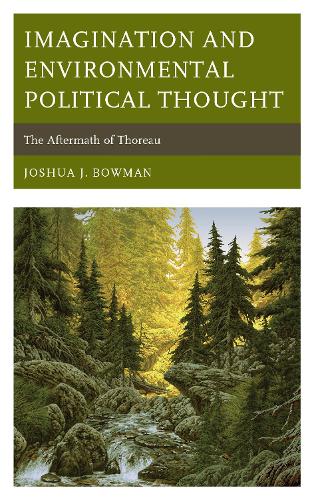
Imagination and Environmental Political Thought: The Aftermath of Thoreau
(Hardback)
Publishing Details
Imagination and Environmental Political Thought: The Aftermath of Thoreau
By (Author) Joshua J. Bowman
Bloomsbury Publishing PLC
Lexington Books
16th March 2018
United States
Classifications
Professional and Scholarly
Non Fiction
Literary studies: c 1800 to c 1900
Environmentalist thought and ideology
Political science and theory
818.309
Physical Properties
Hardback
200
Width 161mm, Height 236mm, Spine 22mm
481g
Description
Imagination and Environmental Political Thought: The Aftermath of Thoreau seeks to correct oversimplified readings of Henry David Thoreaus political thought by elucidating a key tension within his imagination. With the celebration of Thoreaus two-hundredth birthday now past, this study outlines, and builds on, his own understanding of imagination and considers its implications for environmental politics. Despite the use of the word, aftermath, Thoreaus legacy for environmental political thought is primarily constructive and foundational for modern environmentalism. Thoreaus virtues and vices have been inherited by his environmentally-conscious readers. The author of Waldens preference for an abstract, ahistorical higher law, his radical concept of autonomy, and his frustration with government and community foster an impractical political thought characteristic of an idyllic imagination. Nevertheless, Thoreau demonstrates a more prudential and moral imagination by emphasizing the inescapable relationship between the moral order of individuals and the order of political communities and by pioneering the central questions of humanitys relationship to non-human nature. Can this tension of imaginations be resolved What are the consequences of this tension Thoreaus overall vision ultimately creates significant problems with which environmentalists still struggle. While Thoreaus emphasis on freedom and the immaterial aspects of human and non-human nature are of considerable value, his abstract political morality, misanthropy and escapism must be resisted both for the sake of environmental well-being and human dignity. In addition, this book is an exercise in re-thinking how the humanities may provide scholars critical insights to better diagnose and respond to the environmental challenges of our time.
Reviews
Few movements of recent decades have had a more pervasive influence in Western society than environmentalism, but until this penetrating, far-reaching and original study scholars and others have had great difficulty sorting out what is what within this large and complex movement and assessing its strengths and weaknesses. Bowman has the philosophical and historical wherewithal to identify particular strains of environmentalism, including their deeper assumptions, and to provide criteria for critically evaluating them. Some of these strains are shown to diverge sharply. Bowman's thoughtful, incisive way of connecting them to views of human nature and society is indispensable to any serious study of environmentalism, but is relevant also to the study of other prominent social and political movements -- Claes Ryn, The Catholic University of America
As a political theorist who also teaches environmental politics, I found this to be an exciting and much-welcome new work. A fresh look at Thoreau and a valuable contribution to the scholarship of environmentalism, Dr. Bowmans book offers important keys to understanding the linkage between imagination and public policy. -- William F. Byrne, St. John's University
In focusing on the imagination, the faculty that plays a vital if insufficiently understood role in shaping knowledge and action, Bowman provides an original and compelling contribution to scholarship on politics and the environment. Among other things, his theoretical approach sheds light upon ways of thinking about human beings and the natural world that move beyond stale ideological dichotomies and policy proposals. This book should be given serious attention by scholars, and it would be an excellent text to include in political theory and environmental studies courses. -- Justin D. Garrison, Roanoke College
Author Bio
Joshua J. Bowman is a post doctoral fellow with the Louisiana State University Department of Political Science and the Eric Voegelin Institute.
